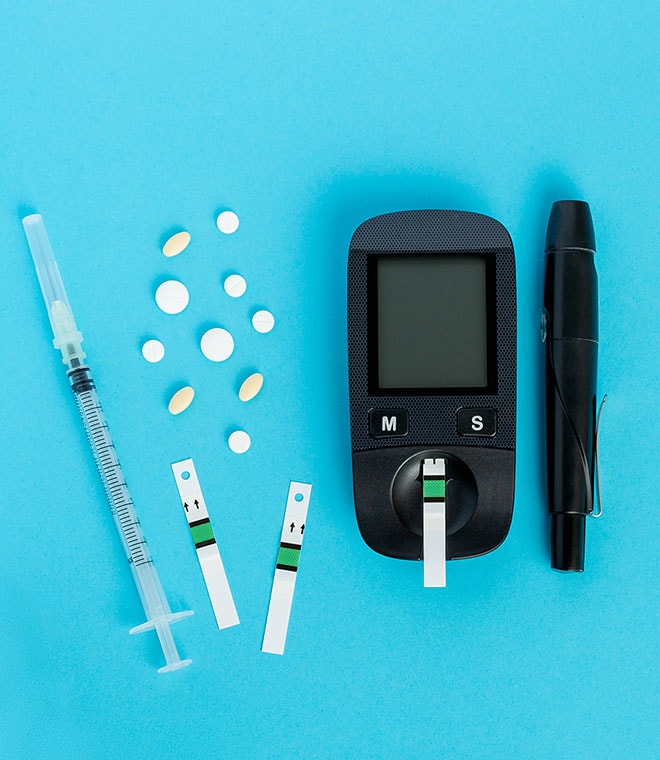Health
Managing nerve pain in diabetes
By Chelsea Grow, Board certified neurologist and headache specialist Aug 19, 2024 • 6 min
Research indicates that 6% to 51% of people with diabetes experience neuropathy. Although this potential complication can interfere with daily life, there are ways to help manage symptoms.
What is neuropathy?
High blood sugar levels associated with diabetes can cause damage to the nerves that carry electrical signals throughout the body. This type of damage is known as neuropathy. Neuropathy symptoms can occur a few years before the diagnosis of diabetes in some people. Diabetes can cause several types of neuropathy, including:
- Autonomic neuropathy is damage to the nerves that control organs. Symptoms may include dizziness, bloating after a meal or even fainting.
- Mononeuropathy is damage to a single nerve. Carpal tunnel syndrome and ulnar neuropathy are common examples of mononeuropathy.
- Peripheral neuropathy is damage to nerves in the feet and legs, and in some cases, the hands.
- Proximal neuropathy is damage to nerves in the hips, buttocks, shoulders or thighs.
- Polyneuropathy is damage to nerves in many different places in the body.
What does neuropathy feel like?
Symptoms related to neuropathy vary but may include nerve pain symptoms such as burning, tingling, stabbing or shooting pain. In some cases, the neuropathic pain can be constant.
In other cases, patients have no nerve pain at all. Instead, they may experience numbness and a lack of sensation in the feet and hands. Neuropathy typically begins in the feet or toes, and it may gradually progress to the knees and then to the hands. It may also be associated with complications, including Charcot foot (no feeling in your feet and ankles) or slow-healing ulcers on the feet or calves.
How is neuropathy treated?
If you have diabetic neuropathy, your healthcare provider can develop a treatment plan based on the type and severity of the nerve damage, your specific symptoms and other factors, such as your age and health history. The following are some potential peripheral nerve pain treatment options:
1. Pain medications: To alleviate nerve discomfort, healthcare providers may prescribe medication for neuropathic pain. Some drugs commonly used to treat nerve pain associated with diabetes include:
- Antidepressants: Duloxetine and tricyclic antidepressants, such as amitriptyline, nortriptyline and desipramine, may relieve peripheral nerve pain in some people with diabetes.
- Antiseizure medications: The antiseizure drugs pregabalin and gabapentin are sometimes prescribed for nerve pain management. Gabapentin may be used alone or with an antidepressant.
- Anesthetic drugs: Topical medications, like lidocaine, may be rubbed or sprayed onto the skin or applied as a patch to numb nerves and relieve pain temporarily.
2. Complementary interventions: Some people reportedly get relief from the use of complementary interventions for nerve pain. These may include:
- Transcutaneous electronic nerve stimulation (TENS) therapy: This therapy stimulates nerves with low levels of electrical current to reduce pain.
- Biofeedback: A mind-body therapy, biofeedback involves learning to relax muscles, alter breathing patterns and take other conscious steps to relieve pain.
- Acupuncture: Performed by a trained professional, small needles or pressure are applied to specific areas of the body.
- Supplements: B12 supplements may help maintain nerve health and are often recommended for neuropathy.
3. Diabetes medications: If you have neuropathy, controlling your blood sugar is critical in preventing the progression of neuropathy and nerve pain symptoms. In addition to dietary changes, several medications are available to control diabetes and, in some cases, may even reverse the condition. Your healthcare provider may recommend checking your blood sugar with a glucometer or a continuous glucose monitoring system to help monitor your progress.
4. Lifestyle changes: Changing your lifestyle can help control your blood sugar levels better and aid in managing nerve pain. Some changes that your healthcare provider may recommend include:
- Eating a healthy diet, high in whole grains, fruits, vegetables and lean proteins, and low in added sugars and saturated fats
- Exercising regularly
- Reducing your intake of alcohol
- Getting enough sleep
- Managing stress
- Checking your legs and feet daily for signs of injury
Can neuropathy be reversed?
In some cases, it may be possible to reverse neuropathy caused by diabetes. However, improvements are usually slow. Controlling your blood sugar levels through medications and lifestyle changes may help support the reversal or healing process. Even if these steps don’t reverse nerve damage, managing your blood glucose levels better can lower the likelihood of neuropathy worsening in the future, and it may reduce your risk of developing other diabetes complications.
Updated August 2024.
Sources:
- https://www.ncbi.nlm.nih.gov/pmc/articles/PMC6755905/
- https://www.mayoclinic.org/diseases-conditions/diabetic-neuropathy/diagnosis-treatment/drc-20371587
- https://www.uptodate.com/contents/diabetic-neuropathy-beyond-the-basics/print
- https://my.clevelandclinic.org/health/diseases/21621-diabetic-neuropathy
- https://www.hopkinsmedicine.org/health/conditions-and-diseases/diabetes/diabetic-neuropathy-nerve-problems
- https://www.niddk.nih.gov/health-information/diabetes/overview/preventing-problems/nerve-damage-diabetic-neuropathies
- https://diabetes.org/about-diabetes/complications/neuropathy
- https://my.clevelandclinic.org/health/treatments/15840-transcutaneous-electrical-nerve-stimulation-tens
- https://www.mayoclinic.org/diseases-conditions/diabetes/in-depth/diabetes-management/art-20047963
- https://medlineplus.gov/ency/article/000693.htm
- https://diabetes.org/about-diabetes/complications/neuropathy/autonomic-neuropathy
- https://www.merckmanuals.com/professional/neurologic-disorders/peripheral-nervous-system-and-motor-unit-disorders/mononeuropathies?query=mononeuropathy
- https://www.merckmanuals.com/professional/neurologic-disorders/peripheral-nervous-system-and-motor-unit-disorders/polyneuropathy?query=polyneuropathy
- https://my.clevelandclinic.org/health/diseases/15836-charcot-foot
- https://my.clevelandclinic.org/health/diseases/15833-neuropathic-pain
- https://www.mayoclinic.org/tests-procedures/biofeedback/about/pac-20384664
- https://www.ncbi.nlm.nih.gov/books/NBK532287/
- https://www.mayoclinic.org/diseases-conditions/diabetic-neuropathy/in-depth/diabetic-neuropathy-and-dietary-supplements/



